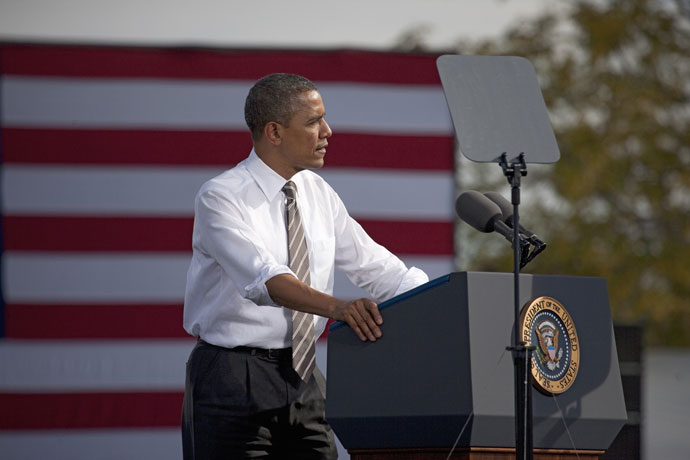Obama To Call For An Overhaul Of NSA Phone Surveillance
President Obama is set to announce that the National Security Agency’s access to private phone records will be severely restricted.
He plans to announce in an 11 a.m. speech today that NSA surveillance, both at home and abroad, will be cut significantly. Intelligence agencies will need to obtain permission from a secret court prior to accessing telephone data. However, the data will remain in the hands of the government.
An official told the New York Times, “The president will say that he is ordering a transition that will end the Section 215 telephone metadata program as it currently exists and move to a program that preserves the capabilities we need without the government holding this bulk metadata.” Section 215 refers to the part of the Patriot Act which allows governments to solicit private business records for counterterrorism purposes.
The official continued, “The president believes that the 215 program addresses important capabilities that allow us to counter terrorism, but that we can and should be able to preserve those capabilities while addressing the privacy and civil liberties concerns that are raised by the government holding this metadata.”
In other words, Obama is looking for a compromise between the government and the people. He understands that citizens feel their rights are being infringed upon, but he also wants the government to have access to data that could be important for national security efforts.
Obama may call for modest changes to data holding, according to the New York Post. Some speculate that he may reduce the amount of time the government can hold onto data, currently set at five years. He may also add provisions about when the NSA can gather bulk data.
Data To Remain With The Government
Many will doubtless take issue with the fact that questionable data will remain in government hands. As of now, however, there doesn’t seem to be an alternative.
A review panel recommended that information be left with the private companies supplying it to the government in the first place. That way, citizens would know that the government only has access to specific information as pre-approved by a judge.
The problem here is that telecommunications firms don’t want any part in this situation. Major firms have expressed that they don’t want to become information repositories for government surveillance.
The review panel also suggested that data be left with an independent third party, which would act as a liaison between private firms and the government. However, no such party currently exists.
Transparency Issues Addressed
The new checks don’t seem to address the heart of the problem, which is that the government has access to private information. White House spokesperson Jay Carney seemed to understand this concern while speaking with the New York Post.
What the new regulations may do, however, is add a level of transparency that the NSA has previously lacked.
Carney said the regulations may make surveillance activities “more transparent in order to give the public more confidence about the problems and the oversight of the programs.”
The Bottom Line
The general NSA surveillance program will remain intact for now, but potentially with an added degree of red tape. Obama’s speech today won’t end the debate on civil liberties, and it won’t end what many consider to be an infringement upon those liberties.
In total, the review panel gave the Obama administration 46 recommendations on how to alter surveillance. Obama is expected to recommend further studies on those recommendations, potentially deciding at a later date to further overhaul NSA data repositories.
Regardless of what Obama calls for in his speech, actual changes will require approval from lawmakers, according to the Associated Press. This raises additional concerns about if and when proposals will go into effect.
Overall, Obama’s speech is expected to leave many questions unanswered and many concerns unaddressed.










































